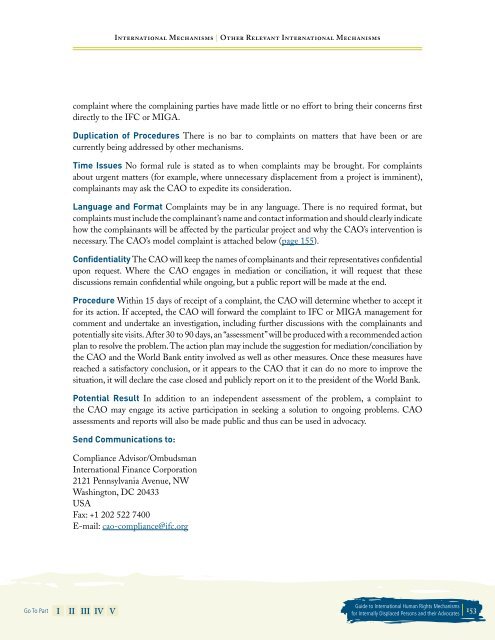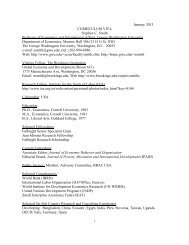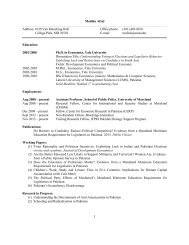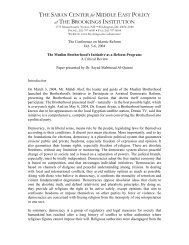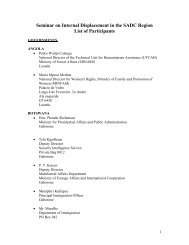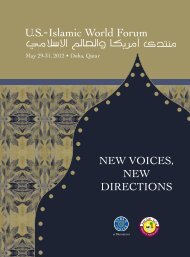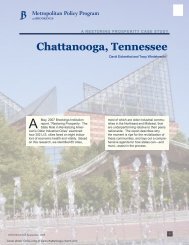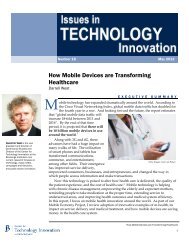Guide to International Human Rights Mechanisms - Brookings
Guide to International Human Rights Mechanisms - Brookings
Guide to International Human Rights Mechanisms - Brookings
Create successful ePaper yourself
Turn your PDF publications into a flip-book with our unique Google optimized e-Paper software.
Go To Part I II III IV V<br />
<strong>International</strong> <strong>Mechanisms</strong> | Other Relevant <strong>International</strong> <strong>Mechanisms</strong><br />
complaint where the complaining parties have made little or no effort <strong>to</strong> bring their concerns first<br />
directly <strong>to</strong> the IFC or MIGA.<br />
Duplication of Procedures There is no bar <strong>to</strong> complaints on matters that have been or are<br />
currently being addressed by other mechanisms.<br />
Time issues No formal rule is stated as <strong>to</strong> when complaints may be brought. For complaints<br />
about urgent matters (for example, where unnecessary displacement from a project is imminent),<br />
complainants may ask the CAO <strong>to</strong> expedite its consideration.<br />
language and format Complaints may be in any language. There is no required format, but<br />
complaints must include the complainant’s name and contact information and should clearly indicate<br />
how the complainants will be affected by the particular project and why the CAO’s intervention is<br />
necessary. The CAO’s model complaint is attached below (page 155).<br />
confidentiality The CAO will keep the names of complainants and their representatives confidential<br />
upon request. Where the CAO engages in mediation or conciliation, it will request that these<br />
discussions remain confidential while ongoing, but a public report will be made at the end.<br />
Procedure Within 15 days of receipt of a complaint, the CAO will determine whether <strong>to</strong> accept it<br />
for its action. If accepted, the CAO will forward the complaint <strong>to</strong> IFC or MIGA management for<br />
comment and undertake an investigation, including further discussions with the complainants and<br />
potentially site visits. After 30 <strong>to</strong> 90 days, an “assessment” will be produced with a recommended action<br />
plan <strong>to</strong> resolve the problem. The action plan may include the suggestion for mediation/conciliation by<br />
the CAO and the World Bank entity involved as well as other measures. Once these measures have<br />
reached a satisfac<strong>to</strong>ry conclusion, or it appears <strong>to</strong> the CAO that it can do no more <strong>to</strong> improve the<br />
situation, it will declare the case closed and publicly report on it <strong>to</strong> the president of the World Bank.<br />
Potential result In addition <strong>to</strong> an independent assessment of the problem, a complaint <strong>to</strong><br />
the CAO may engage its active participation in seeking a solution <strong>to</strong> ongoing problems. CAO<br />
assessments and reports will also be made public and thus can be used in advocacy.<br />
send communications <strong>to</strong>:<br />
Compliance Advisor/Ombudsman<br />
<strong>International</strong> Finance Corporation<br />
2121 Pennsylvania Avenue, NW<br />
Washing<strong>to</strong>n, DC 20433<br />
USA<br />
Fax: +1 202 522 7400<br />
E-mail: cao-compliance@ifc.org<br />
<strong>Guide</strong> <strong>to</strong> <strong>International</strong> <strong>Human</strong> <strong>Rights</strong> <strong>Mechanisms</strong><br />
for Internally Displaced Persons and their Advocates 1


